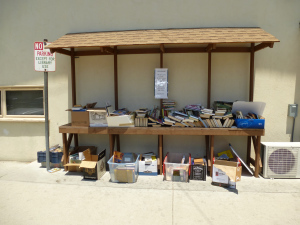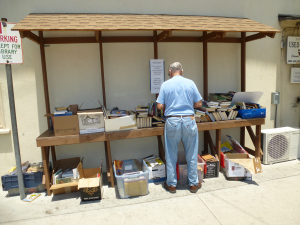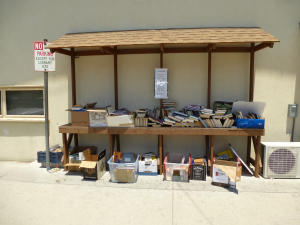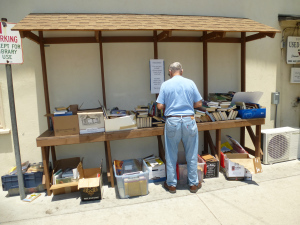Lida Bushloper's Blog, page 16
July 17, 2015
You or Someone You Know
![51EFUpAtvyL._AA160_[1]](https://i.gr-assets.com/images/S/compressed.photo.goodreads.com/hostedimages/1437301094i/15567252.jpg)
![th[3]](https://i.gr-assets.com/images/S/compressed.photo.goodreads.com/hostedimages/1437301094i/15567253.jpg) Have you read either of these two books? If you have, chances are it’s The Girl on the Train, by Paula Hawkins. It’s gotten huge buzz and justifiably so, no matter what your final opinion is. But there’s another book that came out about the same time with a similar title that has gotten nearly lost in the hoopla over the Hawkins book: The Stranger on the Train, by Abbie Taylor. I liked them both. The title alone of the Taylor book, so reminiscent of the classic Patricia Highsmith novel, grabbed my attention, as did the blurb and reviews. The Hawkins book gives a searing look at what it’s like to be an alcoholic. The Taylor book, on the other hand, gives an equally disturbing picture of what it’s like to suffer from depression. And that’s what so impressed me about the novel. Being able to describe what the world feels and looks like for someone suffering from depression is a rare thing in literature. I have not read The Bell Jar
Have you read either of these two books? If you have, chances are it’s The Girl on the Train, by Paula Hawkins. It’s gotten huge buzz and justifiably so, no matter what your final opinion is. But there’s another book that came out about the same time with a similar title that has gotten nearly lost in the hoopla over the Hawkins book: The Stranger on the Train, by Abbie Taylor. I liked them both. The title alone of the Taylor book, so reminiscent of the classic Patricia Highsmith novel, grabbed my attention, as did the blurb and reviews. The Hawkins book gives a searing look at what it’s like to be an alcoholic. The Taylor book, on the other hand, gives an equally disturbing picture of what it’s like to suffer from depression. And that’s what so impressed me about the novel. Being able to describe what the world feels and looks like for someone suffering from depression is a rare thing in literature. I have not read The Bell Jar  (though it’s now on my list.) The other exemplar that I am aware of is Darkness Visible, by William Styron,
(though it’s now on my list.) The other exemplar that I am aware of is Darkness Visible, by William Styron,  although it’s a memoir, not a novel. Getting across what a depressed person experiences is, in my opinion, a nearly impossible task, but Taylor gets it right. It’s a relief to see one’s own experience expressed with such understanding. I’ve never been an alcoholic, but Hawkins’ description of that condition is also illuminating. Neither of these authors is judgmental about their main characters, but neither do they shy away from realism. The protagonists both eventually get the help they need. Their struggles, so well rendered, give both books a richness sometimes not found in mystery novels, which, while they may have been wildly entertaining, often vanish from my memory as soon as I finish them. These novels, on the other hand, still resonate in my mind today, a year after I read them.
although it’s a memoir, not a novel. Getting across what a depressed person experiences is, in my opinion, a nearly impossible task, but Taylor gets it right. It’s a relief to see one’s own experience expressed with such understanding. I’ve never been an alcoholic, but Hawkins’ description of that condition is also illuminating. Neither of these authors is judgmental about their main characters, but neither do they shy away from realism. The protagonists both eventually get the help they need. Their struggles, so well rendered, give both books a richness sometimes not found in mystery novels, which, while they may have been wildly entertaining, often vanish from my memory as soon as I finish them. These novels, on the other hand, still resonate in my mind today, a year after I read them.


August 6, 2014
WTF

One can never have too many bookmarks
So many acronyms regarding books: TR (to read); TBR (to be read) WTR (want to read); CR (currently reading). So far I’m the only person I know who uses WTF (want to finish). I have shelves of half finished, partially finished, or barely-cracked-the-covers-of books. To be clear (TBC?) these are all books I want to finish. I’m not the kind of reader who feels like I must finish every book I start. Heck, no. If a book is plain bad, out it goes. I don’t care about the time I’ve already invested. I don’t think, optimistically, well, maybe it will get better. Fie on that. Life is short and there are thousands of fabulous reading experiences to be had. On to the next. But I still end up with shelves notable mostly for the sparkling collection of bookmarks that adorn them. There’s always a reason for putting down a book in mid-read, often that some other (usually newer) book has caught my eye. I may have a book review deadline looming, and that book then takes precedence. Library books trump books I own, since I’d rather not pay overdue fines. I also read multiple books at once, necessitating bookmarks in each volume of the current stack. Those are some of the practical reasons. There are other, less tangible ones. Many books start out slow, with background, before they really get going. I have trouble disciplining myself to plow through it, but I’m afraid to skip over it in case I need the information later. So, I stall. Other books turn out to be not quite what I expected. Yet, they have appeal and I still believe I want to know what’s in them. Like many readers, I have shelves and shelves of books that I haven’t even begun yet, in addition to the ones I’ve already started. The WTF books, however, are a class all their own. A while back, I decided to dedicate one month to working my way through my WTF collection. I got nowhere. Since I no longer have to read assigned material for work or school, there’s just too much pleasure in jumping from one subject to another, one genre to another, as my fancy suits me, or as whatever time slot I have allows. Meanwhile, I do actually finish tons of books, at least two a week. But the stellar offerings just keep coming, more than anyone can read in a lifetime. To which I say, YEAH!


June 28, 2014
The ���Free Table������In Which I Finally Get Around to Explaining All Those Earlier Cryptic References.

The Free Table behind our local library.
It used to be the ���free bench.��� Against the back wall of our local library, handy to the parking lot, there were a couple of old benches. They sat under the building���s overhang, so they had some protection from what little inclement weather we get in this dry climate. People dropped off books and magazines they no longer wanted and anyone was welcome to take whatever was there. The free bench was a regular stop for a large segment of the population, both for browsers hoping to pick up something to read and for others, clearing out their shelves. Or basements, attics and garages.
Then, a few years ago, for their community service project, the local Boy Scouts built a sturdy wooden table, covered with a slanted shingle roof to house the free materials.�� This spot is as much a part of the community as the parks, sidewalk caf��s and post office.�� You regularly run into friends, neighbors and familiar dogs.�� Sometimes there’s a wealth of stuff, other times it’s slim pickings.�� You never know what’s going to show up and many folks (yeah, me) stop by every day.�� (In my defense, I live only a block and a half away, and walk to the library nearly every day in any case.)
Things look a little (ahem) scattered in this photo, but volunteers often take the time to sort, organize and arrange materials. Not only do private citizens make��items available, but when the library weeds its collection, sometimes the discards also end up here.
This is not a particularly new or unique idea.�� Many libraries have��a shelf or a bin inside their facility for��giveaways, especially outdated magazines.����One workplace I knew had a shelf in the break room for the same purpose.����Staff members could drop off books for others to enjoy. (See also the Little Free Library concept.)

A patron browses the offerings on the “free table.”
To the right of the table, there is a set of concrete steps that lead down to a��door into a basement area.����Signs tell people to leave donations which are of better quality or in better condition��for the Friends of the Library��used book sale��there instead of putting them on the��free��table.��Signs also request that browsers not rummage through those boxes and bags,��which are property of the��Friends, and most people comply. Not everybody follows the suggestion about the best books going to benefit the Friends, however, and amazing treasures show up on the free table.�� More about that in another post.
The “Free Table”—In Which I Finally Get Around to Explaining All Those Earlier Cryptic References.

The Free Table behind our local library.
It used to be the “free bench.” Against the back wall of our local library, handy to the parking lot, there were a couple of old benches. They sat under the building’s overhang, so they had some protection from what little inclement weather we get in this dry climate. People dropped off books and magazines they no longer wanted and anyone was welcome to take whatever was there. The free bench was a regular stop for a large segment of the population, both for browsers hoping to pick up something to read and for others, clearing out their shelves. Or basements, attics and garages.
Then, a few years ago, for their community service project, the local Boy Scouts built a sturdy wooden table, covered with a slanted shingle roof to house the free materials. This spot is as much a part of the community as the parks, sidewalk cafés and post office. You regularly run into friends, neighbors and familiar dogs. Sometimes there’s a wealth of stuff, other times it’s slim pickings. You never know what’s going to show up and many folks (yeah, me) stop by every day. (In my defense, I live only a block and a half away, and walk to the library nearly every day in any case.)
Things look a little (ahem) scattered in this photo, but volunteers often take the time to sort, organize and arrange materials. Not only do private citizens make items available, but when the library weeds its collection, sometimes the discards also end up here.
This is not a particularly new or unique idea. Many libraries have a shelf or a bin inside their facility for giveaways, especially outdated magazines. One workplace I knew had a shelf in the break room for the same purpose. Staff members could drop off books for others to enjoy. (See also the Little Free Library concept.)

A patron browses the offerings on the “free table.”
To the right of the table, there is a set of concrete steps that lead down to a door into a basement area. Signs tell people to leave donations which are of better quality or in better condition for the Friends of the Library used book sale there instead of putting them on the free table. Signs also request that browsers not rummage through those boxes and bags, which are property of the Friends, and most people comply. Not everybody follows the suggestion about the best books going to benefit the Friends, however, and amazing treasures show up on the free table. More about that in another post.
June 19, 2014
Found
I wrote before about donating books to libraries for their used book sales. I followed this with a column about donating books signed by their authors, and the possible awkwardness which it might cause. Now, let me tell you when it happened to me. I published Fault Lines, a book of poems in 2012. Most of my buyers wanted me to inscribe it to them, which I did, following the policy I mentioned in the earlier post. Without my knowledge, one of my books ended up in a Friends of the Library bookstore in a nearby town. One of my friends who is a librarian there spotted it and snapped it up. He had not been around when the book first came out to buy a copy. He sent me an email, mentioning several of the poems that he especially liked. Now, every writer loves to hear that his or her work has had an effect on a reader. But I was also glad that a copy ended up in the hands of yet another friend. My only concern was this: had one of my books already been discarded by the person who bought it? After only two years? Yikes. I purposely refrained from asking my friend to tell me the name in the inscription. Truth to tell, I suspect it was a fellow writer who died last November. She lived near that library and it would be natural for her heirs, in closing up her condo, to donate her books to the closest library. If so, I’m just happy my book benefited both the Friends of the Library, even if was only to the extent of a dollar, and also gained me yet another reader. Not only was it not awkward, it was uplifting.
In another, unrelated incident, I was Googling my name and found an offprint of an article I wrote for the Huntington Library Quarterly for sale by a rare book dealer somewhere in Northeast. I live in Southern California. How the heck . . . ? I can speculate, but it’s more of a amusing mystery than anything else. I’m sure I’m not the only writer who has had such things happen.
A third minor incident occurred several years ago. I had published a short story in a small journal. I only had a couple of copies, but a friend wanted to read it, and since I saw him fairly often, I thought it was safe to lend him one of my precious copies. But, for various reasons, he never returned it. I like to keep at least two copies of everything I publish, so I was a little vexed. But, a couple of years later, I came across a copy (not mine) of the journal with my story on our local library’s “free table,” which handily replaced my missing copy. Another happy ending and another reason why I haunt the “free table,” which I keep saying I’ll talk about in another post—soon, I promise—soon.


June 12, 2014
Awkwaard!
When I talked about where to discard books when you are ready to, I hinted at a couple of tricky situations. You probably already know what they are. One is when you have a book which you no longer want, but it is signed by the author. Could be several reasons for this. The one most common for me, is that I got caught up in the excitement of a dynamic author talk/reading and bought a book, only to realize later, it’s not my kind of thing at all. I have a lot of writer friends, and I used to buy all their books just to be supportive. A good motive, sure, but I ended up with stuff I didn’t really want. One time I really did want a book from an author, but she was sharing a table with another writer whom I did not know. It felt awkward ignoring the second author, so, sure enough I bought both of their books. In all of these cases, of course, the author graciously autographed the items to me. But then, how do you get rid of them? Yeah, I can pass them on in one of the ways described in the previous post. But, (call me over-sensitive), I’m not comfortable having my name end up in books being perused by other book buyers. (And with a name like mine, it couldn’t very well be anyone else.)
In the past, I have solved this by 1) razoring out the offending page, as long as it does not make the book unusable for someone else, or 2) using liberal black marker to obliterate my personal information. (I know, some of my friends will be appalled to read about defacing a book in any way. Tough.)
I also don’t like to just dump a signed copy, because, wouldn’t you know it, somehow the author him or herself will stumble across it, and I don’t want to be a factor in the chagrin they must feel at finding their hard work reduced to a giveaway pile. Worse still, if the author is a friend, I’ll be running into her any minute now along with her hurt feelings and insulted ego. Sure, every writer knows this is the ultimate fate of many of their books. One bestselling author (I can’t remember who), jokingly remarked that being a bestselling author meant that he could brag that he had more books in landfills than any other writer.
Now, I have a new method. I don’t let authors, whether they are my friends or not, sign their books when I buy them. After all, I buy books at signings to support the author’s work, not obtain a souvenir or treasure. (I have a few exceptions, perhaps two or three signed books that I do cherish, including Schindler’s List, signed by Thomas Keneally.)
And when I sign my own book for others, I sign on the first page of the front matter, which is blank. That way, if they, sometime in the future, want to razor that page out, the rest of the book remains undamaged. In the next post, I’ll tell about how one of my own books ended up at a used book store, but with a much more positive ending.


June 6, 2014
Where Do Books Go?
In the previous post, I talked about where books come from. But once a reader has read them, where do they go? I know several people who keep their books—every one of them—even after they’ve read them, presumably forever. I’m not like that. I know I’m unlikely to re-read a book and I hate stuff piling up. If you regularly weed your books, you already have methods or places for disposing of them. But here’s a list of options anyway.
Friends of the Library, for their used book sales (occasionally, depending on Friends’ and the Library’s policies, these may end up in the Library’s collection.)
Donations to thrift shops, either ones run by small local organizations, or the Big Boys of thrift shops, e.g. The Salvation Army. Our local Goodwill actually has a separate store, just for used books. For these first two options, you can usually get a tax deduction.
Pass them on to friends who want to read them.
Drop them off at a senior center, women’s shelter or similar place, if they are appropriate.
Sell them on line. There are a ton of used book buying web sites, each with their own preferences for what they buy and condition requirement, or you can go through eBay or Amazon.
Sell them to used book stores or trade them in for other used books. My sister single handedly keeps Florida’s Chamblin Bookmine in business. Lots of used book stores have this model.
If you have something truly unique and valuable, a rare book or special collections library might be interested. But don’t count on it. This is a long shot.
(Reader Discretion Advised: The following suggestion may be upsetting for some readers.)
Toss them out. Yes, in the trash. Drastic? Yes. Unthinkable? Not to me. I’m not one of those folks who think the physical artifact is a sacred treasure. (Unless, of course, it is a sacred treasure—a rare book, a family heirloom, a childhood favorite.) Nor do I think that every single book deserves to be recycled to some other needy reader. As I wrote in the previous post, books are everywhere in abundance. Nobody needs to be stuck with really bad ones. Plus, there comes a point when a book is so damaged, dirty or otherwise yucky, that it would be a sin to foist it off on someone else. If you are a fan of the TV shows Hoarders and Hoarding: Buried Alive as I am, you know what I mean.
Finally, leave them on the “free table.” I mentioned this in the previous post and I promised to tall more about it in the future.
There are a couple of tricky situations that can gum up the works. I’ll talk about them in the next post. A final word: if you keep all your books forever, none of this will apply to you. Just your heirs.


June 4, 2014
Where do books come from? (No, not from Mommy and Daddy books.)
If there were a survey that asked “Where/how do you acquire your books? (mark all that apply)”, my response would look something like this:
Traditional bookstores
Used bookstores
Online
Thrift shops
Other stores, e.g. supermarkets, home and garden centers, office supply stores
Yard sales
Library book sales
Borrow from library
Borrow from friends
Gifts from friends
From the author (at book signings/readings)
Books laying around on bus benches or in coffee houses (some of these may be from Book Crossing or other similar endeavors)
Little Free Library (and if you don’t know about these yet, please visit the site)
the free table (I’ll talk about this in a future post).
If you are a reader (and you know who you are), you have a similar (long) list.
And for one more new idea for getting books to the people, check out the “pop-up”, open air reading rooms provided by The Uni Project.
Books are everywhere. Life is good.


March 3, 2014
A Mantra For Writers–and Others
I have too many books. So, every now and then, I weed. Or try to. In doing so, I unearth unusual things, surprises and, all too often, duplicates (oops). Sometimes I can scan a book quickly and add it to the donate pile. Other times, the book is worthy of a full read, so it goes back on the shelf. Once in a while, an item is quirky enough to entice me to read the whole thing. Sometimes I’m a little disgusted with myself for what turns out to be a waste of time. But other times I come across one thought that makes it worthwhile.
 I just finished Jews Who Rock, by Guy Oseary (St. Martin’s Griffin, 2001). The entry for Adam Gaynor of matchbox 20 includes this note: “Adam’s personal motto is “Inner strength . . . inner peace . . . focus . . . fire.” It seems like a perfect guiding phrase for artists, including writers. Like me. Or maybe you.
I just finished Jews Who Rock, by Guy Oseary (St. Martin’s Griffin, 2001). The entry for Adam Gaynor of matchbox 20 includes this note: “Adam’s personal motto is “Inner strength . . . inner peace . . . focus . . . fire.” It seems like a perfect guiding phrase for artists, including writers. Like me. Or maybe you.


February 20, 2014
Links to King’s River Life mystery stories
I’m posting links to my short mystery stories in King’s River Life. “Every Day is Mother’s Day” appeared in the May 7, 2013 issue. “Born On the 4th of July” appeared in the July 2, 2013 issue. And “A Bag of Bagels” was published in the Sept. 12, 2013 issue. If you haven’t read them yet, I hope you do. They were fun to write, and King’s River Life carries lots of great stories of all kinds.








